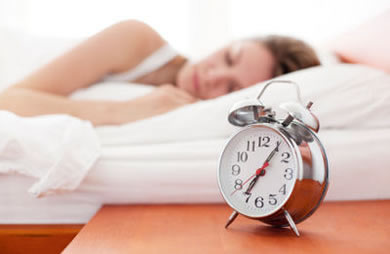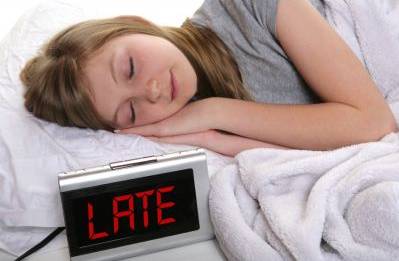
A good night’s sleep is exactly what the doctor ordered. It helps to form new pathways in the brain so we can retain more information, it’s essential for physical repair and healing, and it makes us feel more productive. There is no greater feeling than waking up refreshed, arms stretched, in silk pyjamas, like a perfectly poised coffee advert.

And yet, twice a year, every year, we’re jerked out of our blissful sleeping patterns and forced to live life an hour out of kilter. Prepare yourselves, because from this moment until Saturday evening you will likely have to navigate the tango that is ‘don’t forget to turn the clocks forward’, ‘I thought they go back’, ‘it’s definitely forward, by an hour.’
For the record, this Sunday at 1am they go back an hour. Goodbye Daylight Saving Time, hello the long tunnel of winter.
It’s easy to wonder if the sudden jolt in time is detrimental to your health. After all, the doctor doesn’t recommend a good night’s sleep for no reason.
Joseph Gannon, 29, Chief Sleep Physiologist and Clinical Lead at The Sleep Disorders Clinic believes the sudden change can be cause for concern, though mainly for a minority of people with underlying health conditions. ‘If you’re healthy, have a good amount of sleep and are young, there’s not too much of a consequence,’ he says. ‘The people it can effect are those that are already sleep deprived, particularly with conditions such as sleep apnea.’
Gannon goes on to explain how Daylight Saving Time changes ourcircadian rhythm. ‘Your rhythm is how your body regulates your 24 hour body clock and it’s dictated by light. For example, if you think back to when we were cavemen and women, in the morning the light would enter our eyes, which would reduce the amount of the hormone melatonin being produced. [Melatonin is a natural hormone that helps induce sleep and is prohibited by light.] Then as the sun sets, not having that inhibitory effect from the sunlight, the melatonin level increases in our body and we start feeling more tired.’
Your Sleep Habits Could Be Why You’re Packing on Pounds
How to tackle tiredness
Reduce your intake of sugar, wine, gluten and dairy
‘These cause the most hormonal inflammation, which can lead to poor sleep,’ says Dr Talib, who advises swapping wine for clear spirits like gin or vodka (in moderation), and making your meals more vegetable based.
Take supplements
‘They’re a great way of supporting hormonal balance,’ says Dr Talib. ‘Poor gut health is linked to tiredness, so a good probiotic is a great place to start.’ Try Dr Nigma Talib Healthy Flora supplements (£47 for 30, net-a-porter.com). ‘Vitamin D, C, B Complex and magnesium supplements are also good for everyday tiredness.’ For magnesium, try Wild Nutrition Food-Grown Magnesium (£16.50 for 60 capsules, wildnutrition.com).
Eat fat
‘Low-fat diets aren’t great for sleep,’ says holistic doctor Dr Sohere Roked, author of The Tiredness Cure. ‘Hormones are made from fat and if we don’t get enough good fat in our diet certain hormones become imbalanced, which can contribute to tiredness.’ So include avocado, oily fish, nuts and seeds in your diet.
Exercise
A University of Georgia study found that sedentary but otherwise healthy adults who began exercising moderately three times a week felt 65 per cent less fatigue after six weeks.
Stop aiming for eight hours
‘It’s a myth,’ says Dr Stanley. ‘Our sleep needs are like fingerprints, entirely individual. Anywhere between four and 11 hours is normal – if you only need five hours, you’ll feel refreshed after five hours.’ But how do you know if you’ve had enough? ‘By 11am, you’re on the rising phase of your circadian rhythm. If you’re getting enough sleep you’ll feel wide awake and alert.’
With an hour less of light in the evenings, our melatonin levels are likely to be higher, leaving the British people feeling a little more groggy than usual. Gannon says it may take a couple of weeks to shake that lethargic feeling. ‘You often have people who are morning people and people who are evening people so this time around, morning people will probably suffer a little bit worse.’
There’s also evidence to suggest that it’s not just morning larks who may be effected this weekend. From car accidents to strokes, a mere hour jump in your body clocks can affect our health and wellbeing
Fatal accidents increase
The University of Colorado at Boulder conducted research into a correlation between Daylight Saving Time and traffic incident-related deaths and discovered that there was a 17 percent increase on the Monday after the Spring change.
Similarly, in 1999, researchers at Johns Hopkins University and Stanford analysed 21 years of fatal car crash data from the US National Highway Transportation Safety Administration and discovered a slight increase of road deaths. The number of deadly accidents went from an average of 78.2 on any given Monday to an average of 83.5 the Monday following the change.

‘It’s an abrupt change,’ says Gannon. ‘Throughout the year seasons change quite gradually. You start with the longest day of the year and then everyday after that it’s slightly shorter and then it’s slightly longer. Daily saving really does add an acute abruptness.’
He goes on to explain that an increase in road accidents may be caused by our melatonin levels being ‘completely out of whack’.
‘Mosts people’s melatonin peaks at 8pm all the way through to 3am – 4am and it starts diminishing. If you’re then putting the clocks back you’re inducing more sleepiness earlier on in the evening.’
So whilst we might able to rest easy, knowing we have an extra hour in bed this time, it’s worth being cautious on the roads in the evening, when you’re prone to a drop in your reaction times.
There’s a spike in heart attacks
Whilst not an issue this time of year, a 2012 study by the University of Alabama at Birmingham suggested that heart attacks spike following the Springtime Daylight Saving Time due to a change in circadian rhythm, sleep deprivation and even a small shock to the immune system.
‘Daylight Saving Time is going to have an impact on the body because it’s a sudden change’ says Gannon, although he adds that there’s probably no major cause for concern unless you have an underlying health condition. ‘It could potentially impact your immune system, however your body will adjust to it and the general population that are healthy should be fine.’
The likelihood of a stroke may rise
Some people may also be at risk of suffering a stroke, according to preliminary research, which found that stroke rates in Finland are 8pc higher in the two days following DST. This is particularly true if you are over 65 or suffering from cancer.
‘What we tend to find is those people that do have a good sleep have a much better level of cortisol, which is a stress hormone within in the body,’ explains Gannon. ‘A high level equals high blood pressure, increased cardiovascular problems, heart attack, diabetes and stroke.’
Diagnosis’ for depression and SAD increase
If waking up in the dark and leaving work in the dark are getting you down, you might find some comfort in knowing you are not alone. A study conducted by The Weather Channel and YouGov in 2014 said that one in three people in the UK suffer from Seasonal Affective Disorder (SAD), often known as ‘winter depression.’
Symptoms may include anxiety, feeling tearful, a persistent low mood, a loss of interest in normal activities and low sex drive. According the study, women are 40 per cent more likely to experience the symptoms than men.
A further study conducted in Denmark found an 8pc increase in depression diagnoses in the month following DST.
Gannon does not find this surprising, ‘What happens is that most people are not getting enough sunlight. Typically, they tend to be office bound, as opposed to outdoor workers.’
He goes on to add that there’s research pointing to SAD being trigger by a cumulation of factors, that reach their height at this time of year. ‘The weather is harsher, rainy, a bit more grey, there are colder temperatures and reduced sunlight and it can impact on SAD.’
‘Those that generally get a good night sleep are in a much better mood,’ smiles Gannon.
Cluster headaches may be worse
Cluster headaches are regarded as the worst kind of headache and many have described them to feel like an excruciating stabbing and penetrating pain. For those who suffer, this time of year may be particularly difficult as they may well be triggered by weather and seasonal changes.
www.thesleepdisordersclinic.com

Leave a Reply